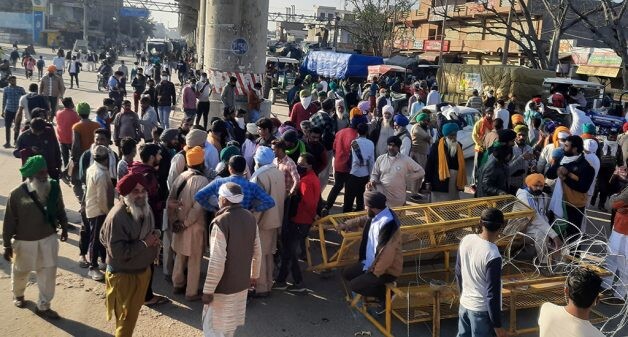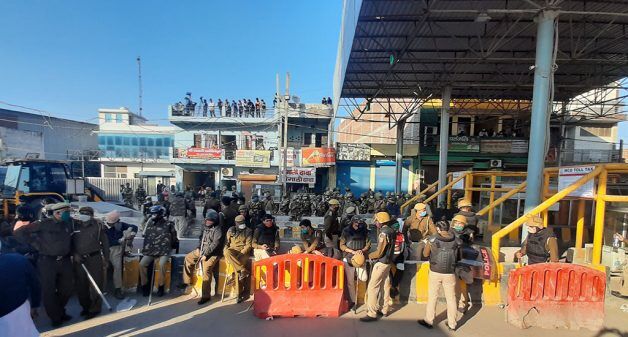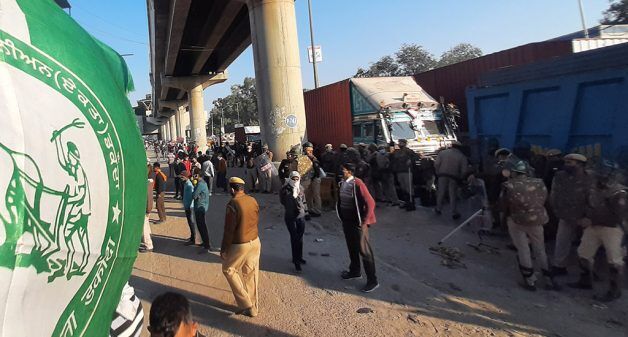
Protesting farmers won’t back down
Despite a victory, protesting farmers show no sign of ending their demonstration on the roads outside Delhi, with thousands heading into the capital to mark the first-year anniversary of their protest.

Despite a victory, protesting farmers show no sign of ending their demonstration on the roads outside Delhi, with thousands heading into the capital to mark the first-year anniversary of their protest.
Farmers protesting against three contentious laws – that were just rolled back – are not in the mood to celebrate.
Though the farmers from Punjab and Haryana rejoiced when Prime Minister Narendra Modi repealed the laws on November 19, they have vowed to continue their protests till the laws are officially cancelled and further demands are met.
Kuldarshan Singh, a 37-year-old farmer from Punjab who has been part of the demonstration since the beginning, said that he would not budge from the protest site till all demands were met.
“We have struggled a lot since last year and roll back of the laws is just a partial victory. We want the government to fulfil our other demands,” he said.
He, along with thousands of other farmers, will mark the first anniversary of their dispute, in the capital.
“We have not deserted out fields as only one member of each farmer’s family is present at the protest site, while others are busy farming as usual. We understand our responsibility to feed millions of people but the government should also support us,” he said.
Emboldened farmers demand more guarantees
The farmers began their protest on the streets outside Delhi against three laws: Farmers Produce Trade and Commerce (Promotion and Facilitation) Act; The Farmers (Empowerment and Protection) Agreement of Price Assurance and Farm Services Act; and The Essential Commodities (Amendment) Act.
The Samyukta Kisan Morcha (SKM), a coalition of over 40 farmers’ unions, welcomed the decision but said it would wait for the formal cancellation of the laws through due parliamentary procedures.

In an official statement the SKM mentioned other pending demands that include a minimum support price (MSP) for crops, withdrawal of the draft electricity bill that threatens power subsidies, removal of a clause prescribing strict punishment for stubble burning from an anti-pollution legislation, compensation for farmers who died during the year-long protest and setting up a memorial for them.
No celebrations yet
“We welcome the decision of scrapping the three laws but we want to know the government’s stand regarding our demand for legalising the MSP and other issues. The government has assured to form a committee regarding MSP but it should also give a tentative deadline,” said Darshan Pal, a member of SKM.
As the cost of production is increasing due to escalating price of diesel and seeds, the farmers want the government to fix a minimum price so that they don’t suffer losses.
Yudhvir Singh, the general secretary of Bharatiya Kisan Union, pointed out that there are no new demands and the charter has only been partially fulfilled.
“We want the crop’s auction price to be above MSP to prevent exploitation of farmers like it happens with jute farmers, particularly in West Bengal,” he said. “They live in poverty as they have to sell the jute at lesser prices.”
“Our demand to legalise MSP is legitimate. In 2014, PM had assured of offering guaranteed MSP to farmers during his campaigns and now he is backtracking. We want a solution to the long pending problem and upcoming protests outside the parliament are aimed at appealing to the government to fulfils its promises,” said Kuldarshan Singh.
What is MSP?
The farmer unions demand that minimum support price (MSP) based on the comprehensive cost of production should be made a legal entitlement for all farmers. The aim is to ensure that every farmer gets at least the MSP for his entire crop.

The government announces MSP at the beginning of the sowing season for 23 crops including paddy and wheat on the basis of the recommendations of the Commission for Agricultural Costs and Prices.
The MSPs were introduced in the mid-1960s when India was trying to achieve food sufficiency under Green Revolution. But the practice is not enshrined in a law, which means that the government is not obligated to announce MSP or procure all the crops produced in the country.
Government smells political gain
The BJP however, blames the opposition and a section of farm leaders for continuing the stir.
“The PM, like the elderly head of the family, took a commendable step and came forward to end the protest. But a section of farm leaders and Opposition are trying to keep it alive for their own vested interests,” said Anila Singh, spokesperson of BJP.
There are differing political opinions about the farmers’ decision not to withdraw from the protests and allegations of their aim to gain political mileage. Many argue the farm union leaders do not want to bring down the curtains to the movement because of upcoming polls in Uttar Pradesh and Punjab.
Many agricultural and economic experts believe there needs to be more diversification of crops – being both better for the environment and the market. They argue that fixing the MSP of wheat and paddy could lead to an increase in production – possibly even a glut – as farmers assured of a fixed return would only cultivate those crops. This might lead to production beyond storage capacity in warehouses, causing big economic losses.
But others claim that most of the farmers are too poor to be at the mercy of the markets and need the MSP to keep them out of poverty.
“Farmers are not demanding that government should buy the entire produce from them, but rather it should set a benchmark for sale and it’s a common demand of farmers globally,” said Devinder Sharma, a food policy analyst.
“The claims that fixing MSP would lead to economic burden are absurd as farmers are generators of economic wealth and food security is dependent on them,” he said.
Gurvinder Singh is a journalist based at Kolkata.